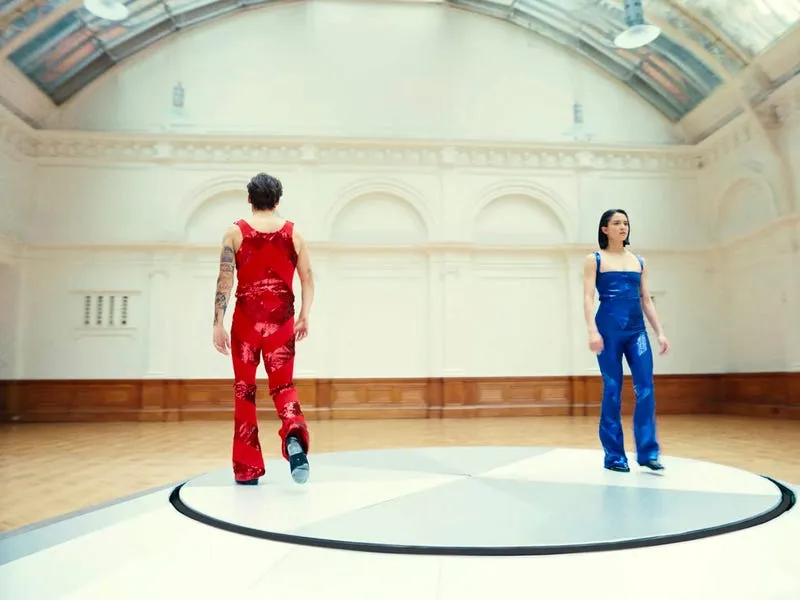

Nobody Saw This Coming: The Hidden Reason Why Harry Styles’ ‘As It Was’ Took Over the World
In the ever-shifting world of pop music, it’s not unusual to see artists drop hit singles and dominate the charts for a few weeks. But what happened with Harry Styles and his single “As It Was” defied all the usual expectations. Not only did the track shoot to the top of the Billboard Hot 100, but it stayed there for a staggering fifteen weeks, becoming a global phenomenon. It wasn’t just popular—it was inescapable, playing in supermarkets, blaring through car radios, and soundtracking millions of TikToks.

But behind the radio-friendly beat and the shimmering synths lies a hidden reason that explains why the song resonated so deeply. It’s not just the music. It’s not just the lyrics. It’s not just the visuals. The real reason why “As It Was” took over the world is far more complex, rooted in emotional timing, cultural shifts, and the subtle genius of Harry Styles’ evolving artistry.
The Sound That Didn’t Sound Like Anything Else
One of the first things people noticed when “As It Was” dropped was how different it sounded—not just from Harry’s previous solo work, but from nearly everything on the charts. Instead of the moody R&B textures or bombastic pop energy that dominated radio at the time, the track opened with a child’s voice and a synth riff that felt lifted from a retro dreamscape. The sound was bright but lonely, fast-paced but oddly meditative. It was a contradiction wrapped in a hook—and it worked.
What many casual listeners didn’t realize is that the soundscape of “As It Was” borrows heavily from 1980s synth-pop, a genre that blends upbeat instrumentals with melancholic themes. Bands like a-ha, Depeche Mode, and The Cure mastered this contradiction decades ago, but it’s rare to see it done so subtly in a modern pop song. Harry Styles, in collaboration with producers Kid Harpoon and Tyler Johnson, didn’t just make a catchy tune—they made a song that felt emotionally and sonically familiar and alien at once.
This blending of old and new, of upbeat energy with sorrowful undertones, tapped into a unique emotional frequency. It mirrored the mood of a world recovering from isolation, anxiety, and loss, especially in the wake of a pandemic. People weren’t just looking for dance tracks—they were looking for something that captured how complicated it feels to be hopeful in a world that still feels uncertain.
Lyrics That Speak Without Screaming
If you read the lyrics of “As It Was” out of context, they might seem oddly cryptic. Lines like “Leave America, two kids follow her” and “You know it’s not the same as it was” feel open-ended, vague, even mysterious. But that ambiguity is part of the song’s magic. Rather than telling a literal story, the song invites listeners to project their own meaning onto it. The chorus, with its haunting repetition of “It’s not the same as it was”, became an anthem for change, for endings, for growing up and moving on.
What’s genius about Harry Styles’ songwriting here is its emotional minimalism. He doesn’t over-explain. He trusts the listeners to fill in the emotional blanks. Whether you hear the song as being about a breakup, fame, family estrangement, or simply the passage of time, it still hits hard. In a culture overloaded with explicit narratives, “As It Was” stands out for being open enough to feel intensely personal to anyone who listens.
The Subtle Power of Vulnerability
While Harry Styles has always projected a level of charm and emotional intelligence, “As It Was” represented a turning point in how he portrayed vulnerability. Gone was the swaggering rock star of “Watermelon Sugar.” Instead, he offered listeners a glimpse of someone reflecting, aching, unraveling in private moments.
The music video amplified this emotional shift. Dressed in a red sequined jumpsuit, Harry runs in circles, alone on a spinning platform, symbolizing the emotional cycle of repetition and disorientation. It’s theatrical but not flashy. It’s stylized but not insincere. The vulnerability feels earned, not forced. And in a world where public figures are constantly curating their every emotion for social media, the rawness in Harry’s performance struck a nerve.
Fans connected to this more introspective side of Harry because it mirrored their own journeys. After two years of global uncertainty, people weren’t just looking to party. They were trying to make sense of a world that had changed. And here was one of pop’s biggest stars admitting, in poetic and vulnerable terms, he was going through the same thing.
The TikTok Effect—But With a Twist
It’s impossible to talk about any modern hit without mentioning TikTok, and “As It Was” was no exception. But unlike many viral hits that explode because of a dance challenge or a meme, this song’s success on the platform came from something different: emotional storytelling.
Users didn’t just lip-sync to the chorus. They used the song to soundtrack deeply personal moments—graduations, breakups, transformations, farewells. The sound became shorthand for “something has changed, and I don’t know how to deal with it.” The line “You know it’s not the same as it was” began appearing on TikTok videos with captions like “me before college” or “life after lockdown,” turning the track into a universal expression of transition.
This type of virality isn’t fleeting. It’s sticky, emotional, and deeply integrated into real human experience. Rather than becoming background noise, “As It Was” became a soundtrack to collective memory, amplifying its resonance and ensuring its longevity across streaming platforms.
Cultural Timing That Couldn’t Be Planned
One of the hidden reasons “As It Was” took over the world was simple, unplannable timing. When the song was released in April 2022, the world was slowly waking up from its long pandemic sleep. People were returning to work, traveling again, reconnecting with friends—but everything felt different. There was excitement, yes, but also grief, uncertainty, and identity shifts.
And into that cultural moment stepped Harry Styles, delivering a song that didn’t try to ignore those feelings but sat quietly with them. The track didn’t demand joy or wallow in sadness. It acknowledged complexity. And in doing so, it met listeners exactly where they were.
This level of cultural synchronicity can’t be manufactured. It’s what happens when art, timing, and human emotion align perfectly. It’s rare. And it’s a big part of why “As It Was” became not just a hit, but a global emotional phenomenon.
Evolution of a Star—And the Trust He Built
Another factor behind the song’s success is the evolution of Harry Styles himself. He’s no longer just the ex-One Direction member or the heartthrob of the moment. Over time, he’s curated a brand rooted in freedom, fluidity, and authenticity. His fashion choices, openness about mental health, and musical risks have built him a fanbase that doesn’t just like him—they trust him.
So when he released a song as emotionally bare as “As It Was,” fans didn’t recoil. They leaned in. They believed in his sincerity. And that trust translated into streams, shares, and deep, emotional connection. This wasn’t just another pop song climbing the charts. It was a message from someone fans felt they had grown with.

In a music industry increasingly dominated by algorithms and engineered virality, genuine trust between an artist and their audience is priceless—and Harry Styles has it in abundance.
The Legacy of “As It Was”
Looking back now, it’s clear that “As It Was” wasn’t just a song that defined 2022—it defined a cultural moment of introspection. It didn’t ride a trend. It became a trend. And more importantly, it provided people with a way to process things they couldn’t quite articulate. Change. Loss. Growth. Uncertainty. All wrapped in a melody that refused to let go.
As the years go by, it’s likely that “As It Was” will be remembered not just for its chart dominance, but for how it made people feel. And in the end, that’s the hidden power of truly great music—not just to entertain, but to reflect the complex truth of the human experience.


















